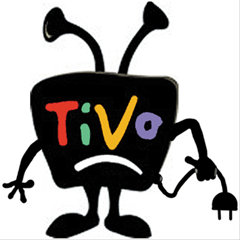
Michael Powell, the former chair of the United States Federal Communications Commission, received his first TiVo, a popular personal video recorder (PVR), as a Christmas gift in 2002. Within days, Powell gushed that the TiVo was "God's machine," predicting that it would have a transformative effect on how consumers watch television by allowing them to easily record programs, pause shows in real time, and quickly skip through unwanted commercials.
Years later, TiVo claims that its service is available in Canada, yet few retailers carry the product. In fact, notwithstanding the growing popularity of PVRs and the ubiquity of VCRs -- the CRTC estimates that 700,000 Canadian households own a PVR and Statistics Canada reports that over 10 million households have video cassette recorders (VCR) -- the absence of the TiVo is not the only difference between the U.S. and Canadian markets. In the U.S., using TiVos and VCRs is clearly legal. In Canada, it is not.
Criminal couch potatoes
While it may come as news to many Canadians that they infringe copyright on daily basis, those involved in the industry are well aware of this state of the law. The law includes a series of copying exceptions that cover research, private study, and criticism; however, there is nothing that clearly permits home recording of television programs. Indeed, the delayed introduction of the TiVo or the Slingbox, another popular product that allows consumers to transfer their television programs over the Internet to their computer and which only entered the Canadian market last year, may stem in part from fears about the legal climate.
Ottawa has regularly introduced legislation demanded by lobby groups (new laws against camcording in movie theatres and Internet rebroadcasting have been passed over the past five years), yet nothing has been done to address the legality of commonplace, non-commercial activities that affects millions of Canadians.
This stands in stark contrast to many of our leading trading partners, including the U.S., Australia, United Kingdom, and New Zealand, who have all passed or proposed legislation that removes the home television recording from the cloud of possible illegality. For example, the U.S. Supreme Court addressed the issue in a case involving the legality of the Sony Betamax machine in 1984. The court sided with Sony, who argued that recording television programs simply enabled users to shift the time when they watch the taped program.
Perfect opportunity
The forthcoming copyright bill provides the ideal opportunity to remedy decades of inaction. Prime Minister Stephen Harpers's government should introduce a new personal network exception into the Copyright Act that would feature three main components.
First, a "time shifting" provision to grant Canadians the right to record television programming for personal, non-commercial purposes. The exception would legalize what is already a common activity for millions of Canadians and might fuel new products and services from Canada's telecommunications and consumer electronics companies.
Second, a "format shifting" provision that would legalize the transfer of content from one format to another. For example, it would expressly permit transferring music on a store-bought CD to an iPod or the transfer of video from a cable box to a personal computer.
Third, a modernized backup copy provision that would address today's consumer realities. The law already permits the making of a single backup copy of a computer program, rightly recognizing that software programs are intangible products that are susceptible to loss. Today, digital data includes CDs, DVDs, and video games, which all suffer from the same frailties as software programs, namely the ease with which hard drives become corrupted or CDs and DVDs scratched and non-functional. Modernizing the law should include bringing this provision into the 21st century by expanding the right to make a backup copy to all digital consumer products.
Christmas cheers
Addressing these issues in the forthcoming copyright bill would be more than just good policy. It would also be good politics, since voters will have little patience for special interest legislation that is geared toward placating U.S. lobby groups rather than considering their needs.
With a bill expected before the year is out, Canadians will soon learn whether Industry Minister Jim Prentice and Canadian Heritage Minister Josée Verner plan to provide an early holiday gift to lobby groups or allow them to use their holiday gifts without fear of breaking the law.
Related Tyee stories:
- TV 2.0
TV is dying. What will replace it? - CanCon Adapts to a Wild New Media World
Satellite radio, TiVo, iPods change the game. - Music Biz Wants Crackdown
Misguided industry pressing PM to nail music copiers.
















Tyee Commenting Guidelines
Comments that violate guidelines risk being deleted, and violations may result in a temporary or permanent user ban. Maintain the spirit of good conversation to stay in the discussion.
*Please note The Tyee is not a forum for spreading misinformation about COVID-19, denying its existence or minimizing its risk to public health.
Do:
Do not: